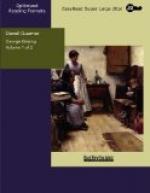“I’m a Radical!—Quarrier for ever!—Come on, one and all of you —I’m ready: fist or argument, it’s all one to me!—You and your Welwyn-Baker—gurr! What’s he ever done for the people?— that’s what I want to know!—Ya-oo-oo-oo! Quarrier for ever!— Down with the aristocrats as wants to make war at the expense of the working man! What’s England coming to?—tell me that! You’ve no principles, you haven’t, you Tory skunks; you’ve not half a principle among you.—I’m a man of principle, I am, and I vote for national morality, I do!—You’re running away, are you?— Ya-oo-oo!—stop and fight it out, if you’re a man!—Down with ’em, boys! Down with ’em!—Quarrier for ever!”
The shouts of hiccoughy enthusiasm came suddenly to an end, and Glazzard, looking back, saw that, in an attempt to run, the orator had measured his length in the mud.
By three o’clock he was seated in his bedroom, very tired but not much disposed to turn into bed. He had put a match to the fire, for his feet were numbed with cold, in spite of a long walk. Travelling-bags and trunks in readiness for removal told of his journey on the morrow. All his arrangements were made; the marriage ceremony was to take place at ten o’clock, and shortly after eleven he and his wife would leave for London on their way to the Continent.
Too soon, of course, to hear the result of Northway’s visit to the Court-house. There would be the pleasure of imagining all that he left behind him, and in a day or two the papers would bring news. He had always sympathized with Guy Fawkes and his fellow-conspirators: how delightful to have fired the train, and then, at a safe distance, have awaited the stupendous explosion.
Poor little Lilian! That was the only troublesome thought. Yet was he in truth harming her? Quarrier would take her abroad, and, in a life of retirement, she would have far more happiness than was possible to her under the present circumstances. Northway would sue for a divorce, and thus leave her free to enter upon legitimate marriage. Perhaps he was doing her the greatest kindness in his power.
When his feet were thoroughly warm he went to bed, and slept well until the servant call him at half-past seven. It was a very bright morning; he drew up the blind and let a flood of sunshine into the room. Contrary to his expectations, no despondency weighed upon him; by breakfast time he was more than usually cheerful.
“Ivy,” he said to his niece, “I have promised to call at the Quarriers’ on our way. We had better start at a quarter to nine; that will give us five minutes with them.”
Of his brother he took leave with much cordiality. William would probably not be much longer at Highmead, and might perhaps join his relatives abroad before the end of the year. In that case, Ivy would accompany him; and she thought with timid pleasure of thus renewing her friendship with Serena under brighter skies.




